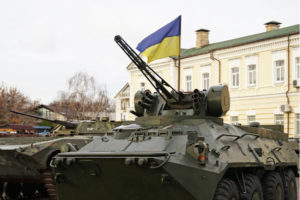So far, the defenders of the Ukrainian capital city, Kyiv, have repelled Russian advances. Now they are preparing for their toughest challenge yet as a long column of Russian and Belarussian forces snakes its way toward the city. It appears Russia is prepared to brutally force its way into the city. Foreign Policy’s Morning Brief reports:
Russian forces are getting in position to encircle the Ukrainian capital Kyiv, U.S. officials warned on Monday, as the civilian death toll rises in the six-day-old war.
Kharkiv, Ukraine’s second-largest city came under intense missile fire on Monday, killing nine and injuring 37, according to the city’s mayor—attacks Ukrainian President Volodomyr Zelensky has called a war crime.
The strategic city of Mariupol in Ukraine’s south has been surrounded by Russian troops. Should that city fall, Russia will have gained control over essentially all the Ukrainian territory on the Sea of Azov, from Crimea in the south to the Donbass region in the east.
And although Ukrainian forces have put up a fiercer fight than expected, the Russian military is far from bogged down, as a 40-mile long military convoy snakes its way toward Kyiv.
It’s also yet to deploy the vast majority of its air support, preferring to use artillery and ballistic missiles to inflict damage. In a RUSI commentary, Justin Bronk explores why Russia’s air assets have largely remained grounded so far. As Bronk observes, the air force could be waiting for a shift in strategy, which appears to have focused so far on limiting civilian casualties, to one that allows for the kinds of indiscriminate bombing tactics employed in the Syrian cities of Aleppo and Homs.
However, the entry of Russia’s air force won’t necessarily be a hammer blow. As the Center for Strategic and International Studies’ Seth Jones and Philip G. Wasielewski wrote in a January preview of a possible invasion, Russia has limited experience of an air operation of the size Ukraine presents. It’s also the first time since World War II that its air force will need to consider a modern opponent, considering its relatively unopposed operations in Syria and Chechnya.
The war is only in its sixth day, and despite well-publicized setbacks, the tide could still turn in Russia’s favor even if it takes a while. The U.S. capture of Baghdad in 2003, considered one of the quickest advances in recent military history, still took three weeks—and even then the U.S. military came up against a much more demoralized force than Russia faces today.
Military analysts warn that Russian frustration could lead to harsher tactics. “Russia’s political leadership is still not conceding their plan’s failure, trying to take Kyiv quickly,” CNA’s Michael Kofman, an expert on the Russian military, wrote on Twitter in a thread assessing Russia’s actions so far. “But we’re seeing them open up greater use of fires, strikes, and air power. Sadly, I expect the worst is yet ahead, and this war could get a lot more ugly.”
If you’re willing to fight for Main Street America, click here to sign up for my free weekly email.






